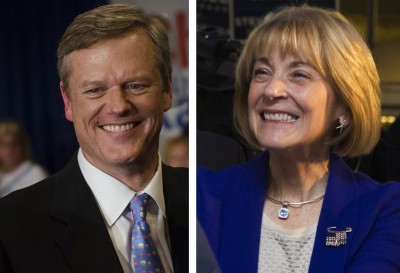
With less than a week before the Nov. 4 election, four of the five Massachusetts’ gubernatorial candidates participated in Monday’s debate, two in person and two through social media.
While Democratic candidate Martha Coakley and Republican candidate Charlie Baker sparred at Worcester’s Hanover Theatre for the Performing Arts, independent candidates Jeff McCormick and Evan Falchuk took to their keyboards, weighing in via online chat throughout the hour-long debate.
Moderated by New England Cable News’ Latoyia Edwards, the debate touched on a variety of issues, including welfare reform, taxes and gender equality.
Baker said he is particularly focused on strategizing to help residents find their way to work, because “everybody wants purpose, everybody wants to work, everybody wants to find their way to a job and I think that should be a fundamental objective of our welfare system.”
Coakley, however, said Baker’s plan would limit how long a person could stay in the government-provided housing.
“I would hope that people who can get out sooner will, and I believe that there’s ways to do that,” she said. “But giving people the work skills they need, the help to get on an economic ladder by investing in them, not looking at cats on the other end.”
Falchuk and McCormick had originally been invited to attend the evening debate, but were later uninvited, The Daily Free Press reported Oct. 27. Independent candidate Scott Lively, who had not been invited to participate in the debate, chose not be a part of the online chat so that he could instead protest outside of the theatre, Lively told MassLive Monday.
“For me, the biggest issue on welfare has to do with the fact that there are far too many people on welfare for far too long,” Falchuk said. “The trouble is that the cost of living keeps going up, which stalls the ability of people to save, to get ahead, for businesses to hire people. It means more and more people are living on the edge and can easily fall into the need for public assistance if something bad happens in their lives.”
When the moderator asked whether the candidates would be open to raising taxes, McCormick responded that working families still have not recovered from the recession.
“[Working class families’] earnings power has gone down, and the income gap has widened,” he said. “My primary goal is putting money back into the pockets of working families. This means reducing the tax burden by finding inefficiencies within government and reducing the costs of living.”
Massachusetts’ economy is moving at twice the pace of any state in the country, Coakley said, and she hopes to see the price of taxes decrease further. Baker, however, disagreed with Coakley’s confidence in the government, and he said the state of the economy is an issue of concern for the Commonwealth’s residents, as they feel they have been “nickel-and-dimed” by the government.
“The people that I talk to when I’m traveling around the Commonwealth are extraordinarily anxious about the state of the economy,” he said. “If they have a job, they’re worried about keeping it, and if they don’t have one, they’re worried about getting one. The working people of Massachusetts have been on the receiving end of dozens of tax increases and fee increases over the course of the past seven or eight years.”
Baker pledged that his administration would consist of women at the highest level with experience and ability. Falchuk supported this effort, emphasizing a need for leaders to address the issue of discrimination against women in the workplace. Coakley acknowledged the issue, but said she would never ask for someone’s vote because she is a woman.
“I am running because of my experience, which I think is important,” she said. “We want to talk about diversity at every level of experience. That means bringing in people with shared experiences, and that includes women. It includes people of color. It includes people who haven’t had a chance to be at the table around issues that really disproportionately impact them.”
Baker was endorsed by The Boston Globe Sunday and has received an endorsement from every Massachusetts newspaper that has made an endorsement in this race, he said.
“I appreciate that what matters, of course, is not a newspaper’s endorsement, or what any polls say,” Coakley said of her opponent’s recent endorsements. “They’re up and down. I believe this race is pretty close right now. People who follow this also believe that. What I’ve been focused on since I got into this race…was on traveling around this state and listening to people about what they needed and where we could go.”
Coakley and Baker will convene one last time Tuesday night at 7 p.m. at Boston Media Consortium in Needham for their final debate before the election.
Alexandra David and Monika Nayak contributed to the reporting of this article.


















































































































